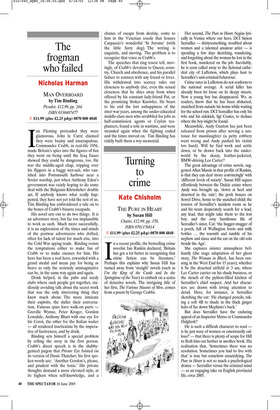The frogman who failed
Nicholas Harman
MAN OVERBOARD by Tim Binding Picador, £12.99, pp. 244, ISBN 0330487477 ✆ £11.99 (plus £2.25 p&p) 0870 800 4848 Ian Fleming pretended they were glamorous, John le Carré claimed they were brainy and unscrupulous. Commander Crabb, in real-life 1956, made Britain’s spies into the figures of fun they went on being until the Iraq fiasco showed they could be dangerous, too. He was the middle-aged chap, tripping over his flippers in a baggy wet-suit, who vanished into Portsmouth harbour near a Soviet warship, just when Anthony Eden’s government was vainly hoping to do some deal with the Bulganin-Khrushchev double act. If anybody knows what really happened, they have not yet told the rest of us. Tim Binding has embroidered a tale on to the bones of Crabb’s bizarre escapade.
His novel sets out to do two things. It is an adventure story, but far too implausible to work as such. Much more successfully, it is an exploration of the times and minds of the postwar adventurers who drifted, often for lack of talent for much else, into the Cold War spying trade. Binding resists the temptations either to make fun of Crabb or to make excuses for him. His hero has been a real hero, rewarded with a grand medal and mean pay for being as brave as only the seriously unimaginative can be, in the same way again and again.
Drink helped, in the pubs and seedy clubs where such people got together, studiously avoiding talk about the secret work that was the only interesting thing they knew much about. The more intricate their exploits, the duller their conversation. Famous spies have walk-on parts Greville Wynne, Peter Kroger, Gordon Lonsdale, Anthony Blunt with one eye for his Corot, the other for the Italian waiter — all rendered inarticulate by the imperative of furtiveness, and by drink.
Binding sets himself a special problem by telling the story in the first person. Crabb’s direct speech is in the shabbygenteel jargon that Private Eye foisted on its version of Denis Thatcher; his first spoken words are: ‘Another Gordon’s, please, and prudent with the tonic.’ His private thoughts demand a more elevated style, at its highest when self-knowledge, and a chance of escape from destiny, come to him in the Venetian scuola that houses Carpaccio’s wonderful ‘St Jerome’ (with the little furry dog). The writing is exquisite, and moving. The problem is to recognise that voice as Crabb’s.
The speeches that ring truest tell, movingly, of Crabb’s devotion to Queen, country, Church and obedience, and his parallel failure to connect with any friend or lover. His withdrawal into secrecy rules out closeness to anybody else, even the sexual closeness that he shies away from when offered by his constant lady-friend Pat, or the promising Stoker Knowles. He bears to his end the lost unhappiness of the inter-war years, among the under-educated middle-class men who scrabbled for jobs as half-commission agents or Ceylon teaplanters, found a role in wartime, and were stranded again when the fighting ended and the times moved on. Tim Binding has riskily built them a wry memorial.
















































 Previous page
Previous page